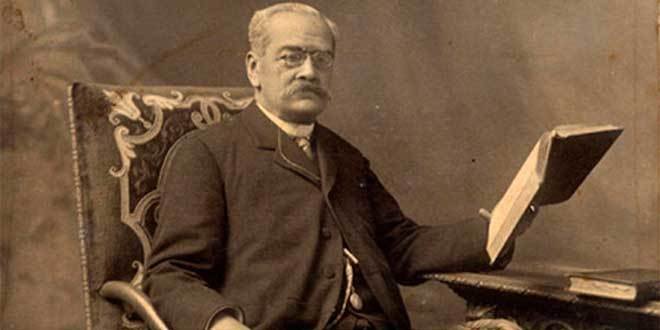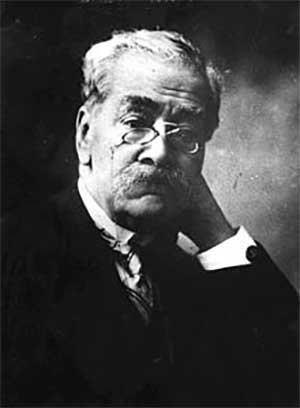
Manuel Ricardo Palma Soriano, creator of the "tradition" genre, was born in Lima on February 7, 1833. His parents were Pedro Palma and Dominga Soriano, middle-class merchants. He continued primary studies at Antonio Orengo's school and Clemente Noel's school. In August 1848, El Comercio published the first verses of Ricardo Palma, who is already the director of a political and satirical newspaper called El Diablo. He entered the convicto of San Carlos in 1849 and, two years later, in 1851, made his debut as a theater author, with La hermana del verdugo. That same year publishes Rodil, drama in three acts (which would later renege), and Consolation, work of romantic poetry. In 1852 he obtained an appointment as an officer of the Navy and collaborated in El Burro, satirical sheet. He publishes Patriotic Crown (1853) and the work brings complications, being forced to interrupt his studies and to get a position as an accountant on the schooner Libertad. He then goes on to serve on the ship Rímac (1854), which would be shipwrecked the following year. His first book of verses is published: Poesía (1855). Ricardo Palma and his generation stirred up the literary and political environment, which he would later talk about in La bohemia de mi tiempo (1899). In 1860 a great political agitation took place, led by José Gálvez, of whom Ricardo Palma is a supporter. On November 23 of the same year he took part in the assault on the house of President Ramón Castilla, his exile to Chile.
Exile of Ricardo Palma to Chile
In 1862 an intense activity in exile continues. Prepares La lira americana, compilation of poetry of the continent, and the Annals of the Inquisition of Lima, historical study. In 1863 an amnesty law was enacted and Palma returned to Peru. Participates in the combat of May 2, 1866. In 1868 Balta's revolution triumphs and Ricardo Palma becomes his private secretary In 1872 the first series of the Peruvian Traditions is published and a book of criticism and compilation: Juan del Valle Caviedes , the poet of the riverbank. In 1876 Cristina Román was married; the couple would have six children. In collaboration with Asisclo Villarán and Manuel Atanasio, Fuentes founded La Broma, satirical period, and designated corresponding partner of the Royal Spanish Academy. In 1881 the Chileans enter Lima and burn the house of Palma in Miradores, with its personal library. The manuscripts of an inconclusive novel, Los marañones, and their memories of Balta's government are lost.
The National Library
General Miguel Iglesias entrusts Ricardo Palma to rebuild the National Library, which had been set on fire and looted by the enemy. For this purpose Palma begins a crusade between writers and friends from several countries, asking for books for the new library, which is worth the nickname of "beggar librarian". In July 1884 the new National Library was inaugurated, of which Palma was appointed director. Prints Poems (1887), volume headed by literary confidences about "the bohemian from 1848 to 1860". It is founded, also in 1887, the Peruvian Academy of the Language, of which it is one of the first members. In 1888 the writer Manuel González Prada attacked Palma and the Academy in a well-known speech at the Politeama theater. There is a controversy between the supporters of both writers, although they never came to face each other personally.
Ricardo Palma lives since 1909 on the second floor of the National Library. In 1910 the municipality of Lima decides to crown it in public ceremony, but Palma declines the tribute. His son Clemente -notable writer of fantastic fiction- attacks in the magazine Variety (1912) the government of Leguia, which costs him his position as conservator of the National Library.
In solidarity, and after 28 years of work, Don Ricardo leaves the library, succeeding his greatest antagonist: Manuel González Prada. On March 11, a group of intellectuals and friends offered him a great tribute, in the nature of national relief, at the Municipal Theater. González Prada reacts by printing an informative note on the National Library of Lima, in which he criticizes the management of his predecessor. Ricardo Palma responds with Apuntes for the history of the library of Lima (1912). In 1914, General Benavides gave a coup d'etat and appointed Palma honorary director of the Library. The position of director is conferred to Luis Ulloa, being dismissed González Prada. He regains his position in 1916 and Palma finally resigns as honorary director. On October 6, 1919, he died at his home in Miraflores, at the age of 86. His funerals are multitudinous and he is given funeral honors corresponding to a Minister of State.

Peace, Abundance, and Liberty Network (PALnet) Discord Channel. It's a completely public and open space to all members of the Steemit community who voluntarily choose to be there.Congratulations! This post has been upvoted from the communal account, @minnowsupport, by CryptoLeader from the Minnow Support Project. It's a witness project run by aggroed, ausbitbank, teamsteem, theprophet0, someguy123, neoxian, followbtcnews, and netuoso. The goal is to help Steemit grow by supporting Minnows. Please find us at the
If you would like to delegate to the Minnow Support Project you can do so by clicking on the following links: 50SP, 100SP, 250SP, 500SP, 1000SP, 5000SP.
Be sure to leave at least 50SP undelegated on your account.